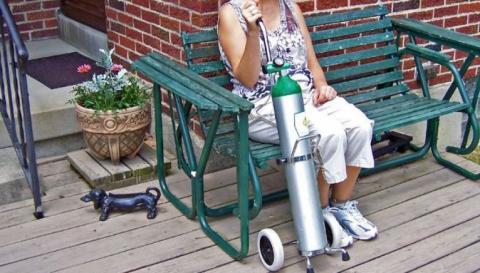I was 38. I was married to the wrong man, but that is a different story for a different time. I was in my living room, sitting on my couch. It was green. I had one hand on my dog, and the other was clutching the arm of that couch so tightly that I felt a fingernail bend near to breaking. I wasn’t thinking of anything. Not really. I was waiting. I was waiting for my life to plummet down a darker hole than even Alice fell on her way to Wonderland. I was waiting for an oxygen delivery, my first oxygen delivery. It would bring me an oxygen tank and a plastic hose to tether me to it. But what I was really waiting for was someone to tell me it was all a dream, or a mistake, or a joke. I could forgive a joke. I might even laugh. But what I couldn’t forgive was the betrayal of my own body, dying without my permission. And I couldn’t forgive that a doctor in a too-small examining room had to tell me what I should have known, or felt, on my own.
In the doctor’s office, I’d only asked a simple question about why it was so hard to breathe on a return flight from New Orleans to Massachusetts. I’d listened to the doctor’s answer, that I was too stressed, too plump, too demanding that medical science find the cause for every little thing we think we feel. After all, doctors (him) and lawyers (me) rarely got along for longer than it took to shake hands at a cocktail party and I knew he was thinking of me as the most dangerous and potentially litigious client. But I’d persisted, even after he told me not to worry. I’d demanded some other explanation, confirming for him everything he thought he knew about the pushiness of lawyers. He’d smirkingly conceded and told me that if I wanted a better answer, I’d need to give up some of my “precious billable hours” and help find it myself. So, I’d taken the tests, blown into the plastic tubes, extended my arm for bloodletting, stood in front of X-ray machines, been injected with dye, and scanned from head to toe. And now it was his turn, again, in this human game of tit for tat, ask and answer, hope and reveal.
I saw him that day through the small glass window of the examining room door. He pulled my file from the little slot on the wall and he opened it. I watched as he closed his eyes and took his handkerchief from his pocket and wiped his forehead and the back of his neck like my grandfather used to do on a very hot day. He squared his shoulders with some resolve and I watched as he reached for the door handle. I felt the sudden urge to keep him out, to bar the door, to shout, “Never mind. I’m sorry I asked. I don’t want to know!” But instead, I sat up in my chair, re-crossed my legs, and came to the realization that if he spoke, any words at all, they would be the kind of words that would change my life forever.
“You’re a lawyer, so I don’t have to sugar coat it.”
Stop, I thought. No. Don’t.
“Your life is almost over. You need to take care of your affairs.”
No. Please.
“Here is the name of a hospice. It won’t be pretty at the end.”
No. This can’t be right.
“You understand, don’t you, that there is no cure?”
No. I… . No.
“Do you hear what I’m saying?”
Stop working, stop living, start dying?
Alpha-1 Antitrypsin Deficiency. I’d never heard of it. I couldn’t understand the words and I asked him to write them down for me on a piece of paper that I folded into four and tucked into the corner of my wallet like a secret. Alpha-1 Antitrypsin Deficiency and genetic emphysema. It was killing me and I couldn’t spell it.
All I knew then, that very first day, was that I’d lose my independence. I’d lose my self-confidence. I’d lose any possibility of ever again walking into a room without people pretending not to stare, pretending to see me as whole, and pretending that they could imagine how I felt to be dying right in front of them, breath by breath, while they watched and pretended it would never happen to them.
I heard the bell ring and saw the white truck in the drive. I rose from the couch, answered the door, and touched that first oxygen tank, softly, with the tips of my fingers, and later I felt the cold plastic across my cheeks. With the first hiss of the tank and the first artificial breath, I closed my eyes.
Yes, I thought. I can do this. I can breathe…until I can’t.




